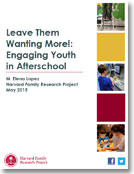The Harvard Family Research Project separated from the Harvard Graduate School of Education to become the Global Family Research Project as of January 1, 2017. It is no longer affiliated with Harvard University.

|
May 20, 2015 Leave Them Wanting More!: Engaging Youth in AfterschoolM. Elena Lopez |
Article Information
- Full Text (HTML)
- Full Text (PDF: 557 kb)
FINE Newsletter, Volume VII, Issue 2
Issue Topic: Engaging Students in Afterschool Learning
Commentary
Afterschool programs are a powerful influence in the lives of young people. They offer safe spaces where youth receive personal attention, find academic support, form friendships, discover their passions, and develop new talents. But the benefits of afterschool programs can only be realized if youth are engaged and take full advantage of the opportunities before them.
In this commentary (PDF), M. Elena Lopez explores the different dimensions along which afterschool programs can engage youth and offers promising practices for afterschool programs to do this well. These dimensions of engagement in afterschool settings include:
- cognitive engagement: the investment of youth to learn and put effort into acquiring information, practicing skills, and developing critical thinking;
- behavioral engagement: the attendance, conduct, and participation of youth in afterschool;
- social engagement: the actions of youth that make them part of a community; and
- emotional engagement: the feelings that youth develop through activity participation and relationships, especially with staff, that can make them feel accepted and cared for.
This resource is part of the FINE Newsletter on Engaging Students in Afterschool Learning. The FINE Newsletter shares the newest and best family engagement research and resources from Harvard Family Research Project and other field leaders. To access the archives of past issues, please visit www.hfrp.org/FINENewsletter.
